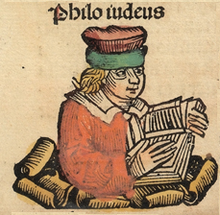Otherwise known as the “Jewish Plato,” Philo shared much of his reasoning. Philo believed that the senses cannot provide knowledge and that sensory experiences can interfere with our direct understanding of and communication with God. He believed that all knowledge and wisdom came from God, not from introspection. However he did believe that the soul should be purified and that true knowledge can be attained only with a purified and passive mind.
Because of his belief that all knowledge comes from God, I think I’m going to categorized Philo with creation. Honestly I’m really torn as to where to put him at all, I like how much he depends on God, but I don’t think it really agrees with our world today which I would classify as in the restoration stage. Today we gain to much of our knowledge from Science and our own life experiences, and in some cases from introspection. Philo’s complete dependance on God for any and all knowledge strikes me as how Eden would have been. Adam and Eve knew nothing, they didn’t study science or sit and ponder, up until the fall they relied fully on God. I wish we lived in a society that depended more on God in this way, I think it would be a more peaceful and agreeable place.


Maddy Spell
8:38 pm, 09.22.13
I really like the way you thought to apply this. Knowledge goes well with the thought of creation. Philo’s understanding of knowledge coming from God, goes along with everything coming from God. I would not have thought to use him in this assignment, so great job!
Irene Anderson
12:09 am, 09.23.13
Well God did give Adam the ability to name the animals and have dominion over them. I think he gave them, desires and they chose to do with it what they wanted.I don’t think he sat them down and taught them everything they needed to know, but they were highly dependent on God for provision for sure. Knowledge can be redemption as well because once you know something or are made aware of something it changes you. It grows you. For example, being made aware of your weakness can help you not do certain things.
Anna Pierce
2:11 pm, 09.23.13
It was interesting how you tied creation with philo. I think it was an appropriate pairing because of his reasoning that knowledge only comes from God. I don’t fully agree with his reasoning, but I totally agree with the pairing. But I liked how you added at the end that our society needs to focus more on God. That’s a good statement, but I think it would be a better thing if society did not rely on God, but that individuals did.
Laura Kate Music
6:54 pm, 09.23.13
In my opinion, comparing Philo to creation is a good match. I do agree with you that now our society is very dependent on hard knowledge and observation. when really, our faith tells us otherwise. We as Christians need to expect to not know all the answers. I have instances of this in my daily life, I try not to over-think things and often tell myself that something was a “God thing.”
Hillary Richardson
11:29 pm, 09.23.13
I think that it was a great comparison to put Philo in creation. I agree that our world today would probably not put him in the redemption stage. His dependence for God does show that creation plays a big role in the way that he thinks and portrays his philosophy. I agree with him that our knowledge comes from God and putting that in the creation category is an awesome way to look at his perspective. God “created” our knowledge and that seems to be what Philo is getting at.
Mengyuan Tang
12:13 am, 09.24.13
I think it is true that knowledge and wisdom come from God and He wants to impart knowledge to us. Bible is the most important way to gain knowledge directly from God. There may be other ways we can also gain knowledge from God, but indirectly.
Jennifer Valenzuela
8:54 pm, 09.29.13
Never thought of this before and I kind of like it. In the beginning Adam and Eve were blank slates, so they couldn’t rely on their experiences or introspection, so they had to rely heavily on God and his knowledge.